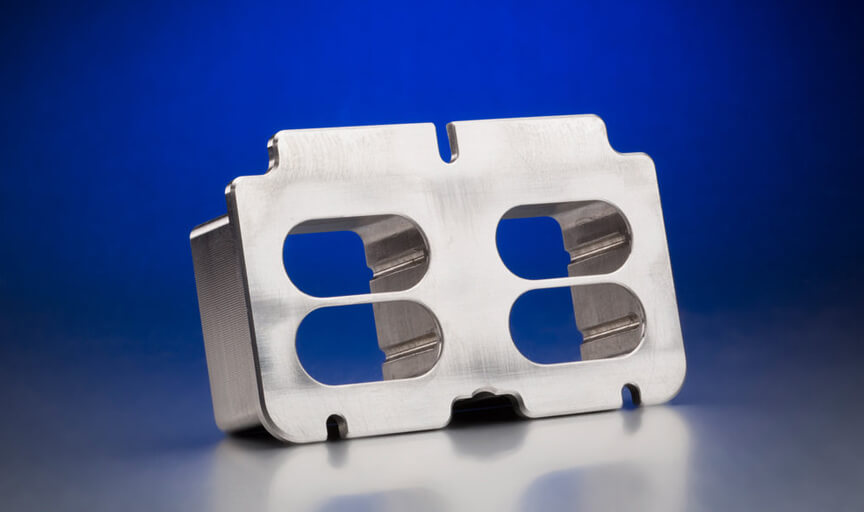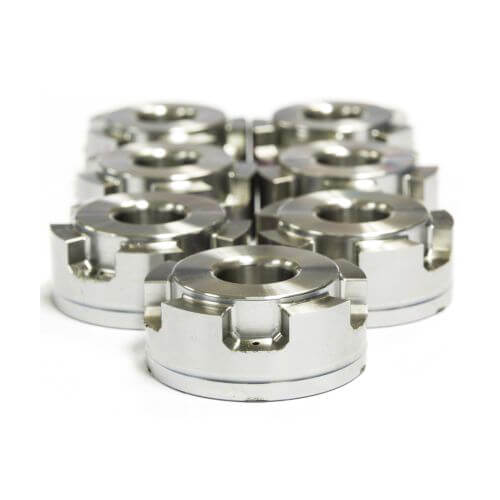- Inicio
- Materiales
- Mecanizado CNC de metales
- Invar
- Invar 36
Invar 36

Tipo de material
Metal
Nombre del material
Invar 36
Nombres alternativos
K93600 | 1.3912 | FeNi36
Compatibilidad de procesos
Fresado CNC, Torneado CNC
Invar 36 en Mecanizado CNC

Invar 36, also known as Alloy 36, is a nickel-iron solid single-phase alloy with a low coefficient of thermal expansion.
It can be easily shaped, machined, and welded using processes similar to austenitic stainless steels, utilizing Filler Metal CF26. The material provides superior dimensional stability, various workability features, and an extremely low coefficient of thermal expansion (CTE). Invar 36 is recognized for its effectiveness in precision machining due to its close-to-zero CTE. This alloy is widely preferred for applications requiring low expansion, as its small CTE makes it a top choice in such scenarios.
Our most common project with Invar 36 is manufacturing precision instruments like clocks, watches, and measuring devices. We also use it in aerospace applications, such as components for satellite systems and instruments on spacecraft, where temperature variations can be significant. There are other industries wherein Invar 36 can be used, such as electronics, metrology and calibration standards, medical devices, etc. Contact our team anytime, and we’ll be happy to guide you.
Tabla de propiedades of Invar 36
| PROPIEDADES MECÁNICAS | |
|---|---|
| Resistencia a la tracción | 510 MPa |
| Límite elástico | 275 MPa |
| Módulo de Young (elasticidad) | 142 GPa |
| Alargamiento a la rotura | 42% |
| Dureza | 90-98 HRC |
| Propiedad física | |
| Resistencia a la corrosión | Bien |
| Magnetismo | Magnetismo |
| Soldabilidad | Moderate to Good |
| Propiedad térmica | |
| Temperatura máxima de servicio | 320-430°C |
| Coeficiente de dilatación térmica | 0.5-2 x 10^-6/°C |
| Conductividad térmica | 10-15W/(m·°C) |
| Propiedad eléctrica | |
| Resistividad eléctrica | 75-85 μΩ*cm |
Conocimientos básicos of Invar 36
What is Invar 36?
Invar 36 es una aleación de níquel y hierro con níquel 36%. Tiene un índice de dilatación térmica bajo en comparación con el acero al carbono.
It is used when minimal dimensional changes are needed with temperature variations or high expansion alloys to achieve the desired motion during temperature changes. It maintains strength and toughness at very low temperatures.
Advantages of Invar 36
Bajo coeficiente de dilatación térmica
Dimensional stability at extreme temperatures
Good mechanical properties at cryogenic temperatures
Excelente resistencia a la corrosión
Minimal thermal expansion mismatch in composite materials
Gran resistencia y tenacidad
Suitable for precision instruments and aerospace applications
Minimal distortion during heat treatment
Weldable and machinable
Applications of Invar 36
Aerospace components (satellites, aerospace instruments, telescope parts)
Scientific instruments (interferometers, telescopes, precision measurement devices)
Electronic components (substrates, connectors)
Cryogenic systems (LNG storage tanks, superconducting magnets)
Thermal expansion compensation (optical systems, laser assemblies)
Medical devices (surgical instruments, medical imaging equipment)
Semiconductor and telecom industry applications
Machining Invar 36 Preguntas frecuentes
Otros Materiales

Acero inoxidable 304
El acero inoxidable 304 es un material muy utilizado en el mecanizado CNC. Es conocido por su resistencia a la corrosión y sus propiedades mecánicas.

Inconel 718
El Inconel 718 es una aleación de níquel-cromo endurecida por precipitación de gran resistencia a la corrosión y a temperaturas extremas.

Acero para herramientas D2
El acero para herramientas D2 es un acero de alto contenido en carbono, alto contenido en cromo, templable al aire, con excelente resistencia al desgaste, alta resistencia a la compresión y buena tenacidad.
Obtenga un presupuesto exacto Para sus próximos proyectos
No importa que su proyecto sea complicado o sencillo, no importa que sea de metal o de plástico, obtendrá un presupuesto preciso en un plazo de 6 horas.
Pida presupuesto hoy mismo